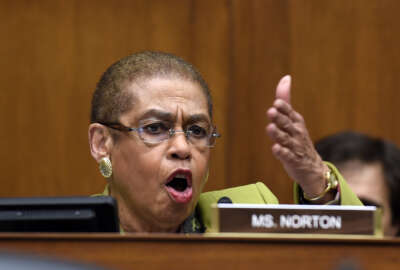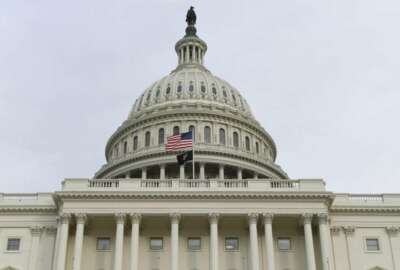
What to expect from Congress as the dust settles
With more of what to expect between now and the next recess, we turned to long-time Congress watcher and The Fulcrum editor in chief David Hawkings.
Best listening experience is on Chrome, Firefox or Safari. Subscribe to Federal Drive’s daily audio interviews on Apple Podcasts or PodcastOne.
The fight might be over, but not the bleeding. The House showed signs of settling down. It passed a minor bill having to do with cloud computing. With more of what to expect between now and the next recess, Federal Drive with Tom Temin turned to long-time Congress watcher and The Fulcrum editor in chief David Hawkings.
Interview Transcript:
Tom Temin: It seems like a smoking battlefield after something horrible has happened up there, doesn’t it, David?
David Hawkings: It sure does. We talk a lot in Washington about how it’s an all time this or a record that. But the post impeachment anger, anxiety and partisan acrimonious may be at a new level.
Tom Temin: Yeah, because I think maybe the peak was when Speaker Pelosi tore up that paper. The speech copy right afterwards, right behind the president. And that kind of I think that said it all, rightly or wrongly.
David Hawkings: Between the handshake snub and the ripping up of the paper and then the back and forth at the National Prayer Breakfast in the White House yesterday. I don’t know where we go from here.
Tom Temin: Any legislative gambits you’re following it all?
David Hawkings: I thought I was going to be following a couple of things. There seemed to be a little bit of movement in favor of a bipartisan agreement to lower prescription drug prices. But the State of the Union suggest that that’s not in the offing. The president talked about his ideas for doing that. Didn’t really, reach out to the Democrats who resorted to standing up and holding three fingers in the air and shouting HR-3, which is there entirely Democratic proposal for lowering prescription drug prices. So doesn’t seem like much prospect for a deal there. In addition, the president talked in his speech about lowering his sights for a big bipartisan infrastructure deal. It’s become a little bit of a joke in Washington that every other week was infrastructure week since President took office. And at that time in 2017 it seems like a president who made his money as a developer and a builder was gonna be really eager to cut a bipartisan deal with Congress for a huge several $100 billion infrastructure plan. Now he’s reduced his sights on that. So those would have been the two things that I would have thought they might have gotten done even in an election year. Doesn’t seem like it. Who knows? The The House is away the week of the 17th for president’s day. Maybe cooler heads will prevail and they’ll come back after that with some ideas for something to do. But we should remember, presidential election year is always the most fallow time for legislating, especially when a president’s running for re election, especially when he’s running for reelection and the Congress is split.
Tom Temin: One other gambit I saw come through from a Republican group called “the Gear” a government reform and efficiency sub group. Not really. It’s more of a caucus than a committee of Republicans came up with a multi 100 page proposal for reforming the government, and one of them was to get rid of federal annuity pensions and go to a total 401k type thing for the TSP and all they chose late last week to come out with that. And yet it seems like there’s little chance that will ever make its way into legislation that would have anything from support via the Democrats.
David Hawkings: I think that’s right. I think, well, these are gestures, right? I think some people would say why I even bother in a year like this? You know, I think the answer is, once you’ve got your proposal ready, you know there’s no there’s no harm in putting it out there and at least allowing people to pick at it. Look at it and consider it that many, many important bills that Congress has done in the 30 years I’ve been watching began, you know, in one year with an idea like that. And then the next year it got a hearing, and then the next year it got maybe a vote in a committee, and then in the fourth or fifth year, it got to the floor, and maybe in the sixth or seventh year, it finally became a law. So it is true that you know advocates, they know this is anything beyond the most simple thing. It’s a multi year game.
Tom Temin: We’re speaking with David Hawkings, editor in chief of The Fulcrum, and you follow the issue of election security and election fairness and, of course, elections are not strictly federal affairs. They’re not at all federal affairs. They’re all local. And then last week we had the really weird occurrences in Iowa. So I imagine that must be heightening concern among all the states and both parties of golly, this’ll major fall event. What’s going on there?
David Hawkings: So what we’re hearing more and more from sort of the experts of the academic experts and election security people is that the fear of hacking is at least as great as the reality of hacking. What happened in Iowa was ultimately that app. The Democrats in Iowa commissioned this app. They got it built real quickly. They didn’t really test it much, and then they you know, it had to work one and only once and only once, and it didn’t work. This was not hacking this was This was bad design, bad deployment and not convincing the people who needed to use it, to even use it. There’s some evidence that may be more than half even 3/4 of the precinct judges out there decided just not even to use the thing. And then they resorted to the old fashioned telephone and the Iowa Democrats didn’t have a big enough phone bank to answer the calls. It has boosted anxiety. Not a lot of Americans are gonna ponder all those details that I just gave you. A lot of them are just gonna say, look, there you go. A small state like Iowa, half of a small state. The Democrats can’t even run a small elections. How am I supposed to believe that my vote’s going to count in the fall. And that fear, that perception, you know, perception makes reality in some cases. What it also underscores is what the experts have been saying and what the country has been doing since 2016 which is really going more and more towards old school voting analog voting instead of digital voting. In other words, paper ballots instead of all electronic ballots. So what could have happened in Iowa might have been, the better thing, which was for Iowa to conduct its election the way they had been their primary, the way they had for many cycles, which was the precinct Captains picked up the phone and called in the results. That might not sound entirely secure, but presumably it was more secure than putting a bunch of pin codes and secret codes out online. What ended up happening is a lot of these judges took photographs of their tally sheets, which had a bunch of coding on it. That a really nefarious actor could have used a hack into the Iowa system. So what’s the lesson for the country?Old school is the best school, and it does seem as though the Little Election Assistance Commission is going to have enough money to at least pour out grand federal money that they’re pouring into the states right now to get them to to buy as much old school secure equipment as they can.
Tom Temin: I guess this is what happens when you let the millennial take over. Instead of having hanging chads, they have apps that don’t work. David Hawkings is editor in Chief of The Fulcrum. As always, thanks so much.
David Hawkings: Thank you Tom.
Copyright © 2025 Federal News Network. All rights reserved. This website is not intended for users located within the European Economic Area.
Related Stories




